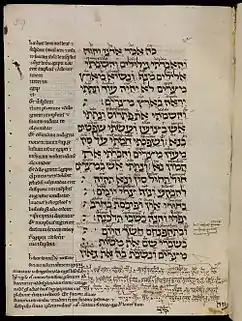Ezekiel 15
Ezekiel 15 is the fifteenth chapter of the Book of Ezekiel in the Hebrew Bible or the Old Testament of the Christian Bible. This book contains the prophecies attributed to the prophet/priest Ezekiel, and is one of the Books of the Prophets.[1] This chapter records a parable about the fate of the "useless" [2] grapevine as a symbol of the nation of Israel at that time.[3] In the New King James Version, this chapter is sub-titled "The Outcast Vine";[4] according to commentator Andrew Davidson, it records "the uselessness of the wood of the vine".[5]
| Ezekiel 15 | |
|---|---|
 Book of Ezekiel 30:13–18 in an English manuscript from the early 13th century, MS. Bodl. Or. 62, fol. 59a. A Latin translation appears in the margins with further interlineations above the Hebrew. | |
| Book | Book of Ezekiel |
| Hebrew Bible part | Nevi'im |
| Order in the Hebrew part | 7 |
| Category | Latter Prophets |
| Christian Bible part | Old Testament |
| Order in the Christian part | 26 |
Text
The original text was written in the Hebrew language. This chapter, the shortest in Ezekiel, is divided into 8 verses.
Textual witnesses
Some early manuscripts containing the text of this chapter in Hebrew are of the Masoretic Text tradition, which includes the Codex Cairensis (895), the Petersburg Codex of the Prophets (916), Aleppo Codex (10th century), Codex Leningradensis (1008).[6]
There is also a translation into Koine Greek known as the Septuagint, made in the last few centuries BC. Extant ancient manuscripts of the Septuagint version include Codex Vaticanus (B; B; 4th century), Codex Alexandrinus (A; A; 5th century) and Codex Marchalianus (Q; Q; 6th century).[7][lower-alpha 1]
Verse 2
- Son of man, what is the vine tree more than any tree,
- or than a branch which is among the trees of the forest?[9]
Verse 6
- Therefore thus saith the Lord God;
- As the vine tree among the trees of the forest,
- which I have given to the fire for fuel,
- so will I give the inhabitants of Jerusalem.[11]
Application of the figure to Jerusalem.[5]
- "Fuel" (Hebrew: אָכְלָה ’āḵ-lāh; 'ok-lah): the Hebrew word actually means "food" as in "food of wild beast", but also used as "food of fire", that is "to be consumed by fire."[12][13] The wood of the vine is worthy only when it produces grapes, otherwise it is useless, so it is thrown to the fire (John 15:6).[14]
Notes
- Ezekiel is missing from the extant Codex Sinaiticus.[8]
References
- Theodore Hiebert, et al. 1996. The New Interpreter's Bible: Volume VI. Nashville: Abingdon.
- Chapter heading to Ezekiel 15 in the New International Version
- Clements 1996, p. 65-66.
- Ezekiel 15:1–8: NKJV
- Davidson, A. B., Cambridge Bible for Schools and Colleges on Ezekiel 15, accessed 21 November 2019
- Würthwein 1995, pp. 35–37.
- Würthwein 1995, pp. 73–74.
- Shepherd, Michael (2018). A Commentary on the Book of the Twelve: The Minor Prophets. Kregel Exegetical Library. Kregel Academic. p. 13. ISBN 978-0825444593.
- Ezekiel 15:2
- Bromiley 1995, p. 574.
- Ezekiel 15:6
- Brown, Briggs & Driver 1994 "אָכְלָה"
- Gesenius 1979 "אָכְלָה"
- The New Oxford Annotated Bible with the Apocrypha, Augmented Third Edition, New Revised Standard Version, Indexed. Michael D. Coogan, Marc Brettler, Carol A. Newsom, Editors. Publisher: Oxford University Press, USA; 2007. p. 1198 Hebrew Bible. ISBN 978-0195288810
Sources
- Bromiley, Geoffrey W. (1995). International Standard Bible Encyclopedia: vol. iv, Q-Z. Eerdmans. ISBN 9780802837844.
- Brown, Francis; Briggs, Charles A.; Driver, S. R. (1994). The Brown-Driver-Briggs Hebrew and English Lexicon (reprint ed.). Hendrickson Publishers. ISBN 978-1565632066.
- Clements, Ronald E (1996). Ezekiel. Westminster John Knox Press. ISBN 9780664252724.
- Gesenius, H. W. F. (1979). Gesenius' Hebrew and Chaldee Lexicon to the Old Testament Scriptures: Numerically Coded to Strong's Exhaustive Concordance, with an English Index. Translated by Tregelles, Samuel Prideaux (7th ed.). Baker Book House.
- Joyce, Paul M. (2009). Ezekiel: A Commentary. Continuum. ISBN 9780567483614.
- Würthwein, Ernst (1995). The Text of the Old Testament. Translated by Rhodes, Erroll F. Grand Rapids, MI: Wm. B. Eerdmans. ISBN 0-8028-0788-7. Retrieved January 26, 2019.